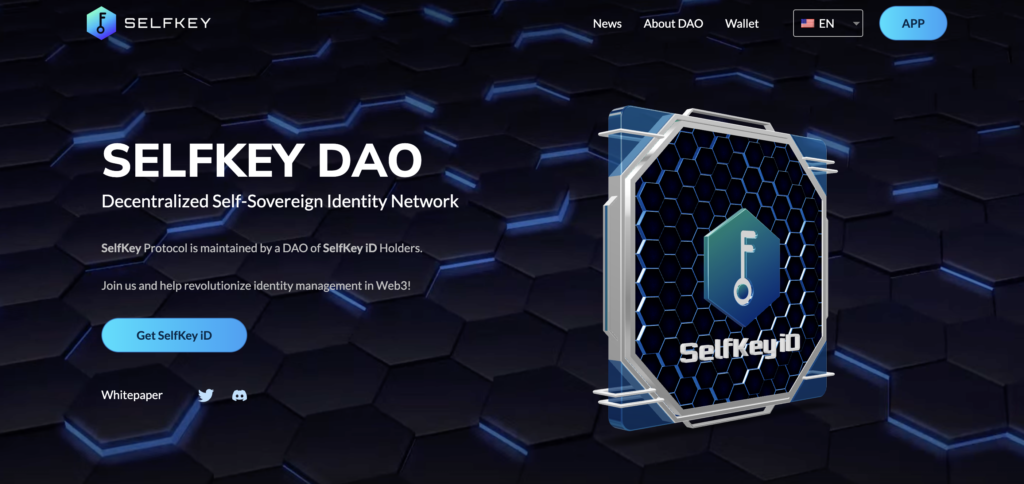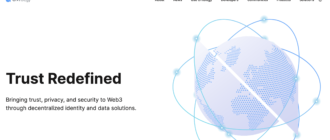The rapidly evolving landscape of blockchain technology continually introduces innovative projects designed to address specific challenges within the digital ecosystem. Among these, SelfKey has emerged as a prominent player, offering a unique approach to identity management in a decentralized framework. This article delves into the intricacies of the SelfKey project, exploring its foundational principles, technological underpinnings, and the various components that comprise its ecosystem. Furthermore, we will analyze the tokenomics of the KEY cryptocurrency, assessing its role within the SelfKey platform and its broader impact on the market. Through a comprehensive examination, this article aims to provide a detailed understanding of SelfKey’s potential for growth and development within the blockchain sector.

What is SelfKey?
SelfKey is a blockchain-based identity management system designed to give individuals and organizations full control over their personal data and digital identity. By utilizing decentralized technology, SelfKey addresses the significant issue of data privacy and security in the digital age. The project aims to empower users to manage, own, and share their identity information securely without the need for intermediaries. SelfKey’s ecosystem includes a digital identity wallet, a marketplace for identity-related services, and a robust network of partners, all of which contribute to a seamless and secure identity verification process. The KEY token serves as the native cryptocurrency within this ecosystem, facilitating transactions and incentivizing participation.
History of the Project
SelfKey was founded in response to the growing need for secure and decentralized identity management solutions. The project officially launched in 2017, marking the beginning of its journey towards redefining digital identity. Key milestones in SelfKey’s development include:
- 2017: SelfKey is founded, and its initial vision and roadmap are introduced. The project quickly gains traction within the blockchain community.
- 2018: The SelfKey Identity Wallet is launched, allowing users to store and manage their identity documents securely. This year also sees the successful completion of the SelfKey Token Sale, raising funds to fuel further development.
- 2019: SelfKey introduces the SelfKey Marketplace, an innovative platform where users can access various identity-related services, including KYC (Know Your Customer) and residency applications.
- 2020: The project expands its ecosystem by partnering with numerous service providers and blockchain projects, enhancing the utility and reach of the SelfKey platform.
- 2021: SelfKey continues to innovate with the introduction of new features and improvements to its identity wallet and marketplace, further solidifying its position in the identity management space.
- 2022: Ongoing developments focus on enhancing user experience and integrating advanced security measures to protect user data and privacy.
Throughout its history, SelfKey has remained committed to its core mission of providing a decentralized, secure, and user-centric identity management solution.
How SelfKey Works
SelfKey leverages blockchain technology to create a decentralized identity management system that prioritizes security, privacy, and user control. The platform is built on Ethereum, utilizing its robust and well-established infrastructure to ensure reliability and security. At the core of SelfKey’s functionality is its digital identity wallet, which allows users to store, manage, and share their identity documents securely. This wallet employs advanced cryptographic techniques to ensure that data remains private and tamper-proof.
SelfKey’s unique approach to identity management sets it apart from traditional systems and other blockchain-based solutions. Unlike centralized identity management systems that are vulnerable to data breaches and misuse, SelfKey’s decentralized architecture ensures that users retain full control over their personal information. Additionally, the SelfKey Marketplace provides a diverse range of identity-related services, offering users a comprehensive platform for managing all aspects of their digital identity.
Blockchain and Consensus Mechanism
SelfKey operates on the Ethereum blockchain, which is renowned for its smart contract functionality and security features. The Ethereum blockchain uses the Proof of Stake (PoS) consensus mechanism, which plays a crucial role in maintaining the network’s security and integrity. PoS allows validators to create new blocks and confirm transactions based on the number of tokens they hold and are willing to “stake” as collateral. This mechanism is energy-efficient compared to the traditional Proof of Work (PoW) consensus, as it does not require extensive computational power.
In the context of SelfKey, the Ethereum blockchain’s PoS mechanism ensures that all transactions within the ecosystem, including identity verification and document sharing, are securely processed and recorded. Smart contracts automate various processes within the SelfKey platform, such as verifying identities and facilitating transactions, minimizing the need for intermediaries and reducing the risk of human error.
Technical Details
SelfKey’s identity wallet utilizes public-key cryptography to ensure that users’ identity data is securely encrypted. Each user has a unique private key, which is required to access and manage their data. This key is never shared or exposed, ensuring that only the user has access to their personal information.
The SelfKey Marketplace is built with interoperability in mind, allowing seamless integration with various service providers. This is achieved through standardized protocols and APIs, which enable different systems to communicate and interact effectively. The marketplace supports a wide range of services, including KYC, residency applications, and banking services, making it a versatile tool for users worldwide.
Overall, SelfKey’s reliance on Ethereum’s blockchain and PoS consensus, combined with its advanced cryptographic techniques and user-centric design, creates a powerful and secure platform for managing digital identities. This technological foundation not only ensures the integrity and privacy of user data but also positions SelfKey as a leading solution in the field of decentralized identity management.
Tokenomics of SelfKey
SelfKey’s native cryptocurrency, the KEY token, is a utility token designed to facilitate various functions within the SelfKey ecosystem. Unlike a coin, which typically operates on its own blockchain, a token like KEY operates on an existing blockchain—in this case, Ethereum. The KEY token plays a crucial role in accessing and utilizing the services provided on the SelfKey platform, including identity verification and document notarization.
Emission Model
The total supply of KEY tokens is capped at 6 billion. During the initial token sale in 2018, a significant portion of these tokens was distributed to investors, with the remaining tokens allocated for development, partnerships, and ecosystem incentives. The distribution model is designed to ensure the long-term sustainability and growth of the SelfKey platform.
KEY Token Distribution:
| Allocation | Percentage |
|---|---|
| Token Sale | 33% |
| Ecosystem Development | 25% |
| Team and Advisors | 15% |
| Reserve | 10% |
| Partnership Programs | 17% |
Utility and Functionality
The primary utility of the KEY token lies in its ability to access services within the SelfKey Marketplace. Users spend KEY tokens to perform identity verification processes, access premium features, and pay for various identity-related services. This model creates a demand for the KEY token, as users need it to engage fully with the SelfKey ecosystem.
In addition to its utility within the marketplace, the KEY token also serves as an incentive mechanism. Participants in the SelfKey network, including validators and service providers, are rewarded with KEY tokens for their contributions, fostering active participation and network growth.
Market Performance
The market performance of the KEY token is influenced by several factors, including market demand for identity services, overall market conditions, and developments within the SelfKey platform. The token’s value has experienced fluctuations, typical of cryptocurrencies, driven by market speculation and the platform’s growing adoption.
The price of KEY tokens has shown a correlation with the adoption rate of the SelfKey platform. As more users and service providers join the ecosystem, the demand for KEY tokens increases, potentially driving up their market value. This relationship underscores the importance of ongoing development and strategic partnerships in enhancing the utility and value of the KEY token.
Inflation and Deflation Mechanisms
SelfKey employs various mechanisms to manage the supply of KEY tokens and ensure their long-term value. Periodic token burns are conducted to reduce the circulating supply, helping to counteract inflationary pressures. These burns are strategically executed based on platform usage and revenue generated from services, aligning the tokenomics with the platform’s growth and user engagement.
Overall, the tokenomics of SelfKey are designed to support a robust and sustainable ecosystem, incentivizing participation while ensuring that the KEY token remains a valuable asset for users and stakeholders within the platform.
Where to Buy KEY Cryptocurrency
The KEY token, native to the SelfKey ecosystem, is available for purchase on several major cryptocurrency exchanges. Here are the prominent platforms where you can trade KEY tokens:
- Binance: One of the largest and most reputable cryptocurrency exchanges, Binance offers a wide range of trading pairs for KEY tokens. Users can trade KEY with popular cryptocurrencies such as BTC and USDT.
- Gate.io: Gate.io, provides a reliable platform for trading KEY tokens. It supports multiple trading pairs, offering flexibility and liquidity for users.
- BingX: Known for its user-friendly interface and comprehensive range of cryptocurrencies, BingX lists KEY tokens and offers various trading pairs to suit different trading strategies.
- Bitget: Bitget is a rapidly growing exchange that includes KEY among its listed tokens. It provides competitive trading fees and a robust security framework.
- KuCoin: KuCoin is a globally recognized exchange that supports the trading of KEY tokens. It offers various features, including advanced trading tools and a secure environment for crypto transactions.
Where to Store KEY Tokens
Storing KEY tokens securely is crucial for protecting your assets and ensuring ease of access when needed. Here are the recommended wallets for storing KEY tokens:
- SelfKey Identity Wallet: The native wallet of the SelfKey ecosystem, this wallet is designed specifically for managing KEY tokens and identity documents. It offers a high level of security, user-friendly interface, and seamless integration with the SelfKey Marketplace.
- MetaMask: A widely used Ethereum wallet, MetaMask supports all ERC-20 tokens, including KEY. It offers browser and mobile versions, enabling users to manage their tokens conveniently.
- Trust Wallet: This mobile wallet supports a vast array of cryptocurrencies, including KEY tokens. Trust Wallet is known for its security features and ease of use, making it a popular choice among crypto enthusiasts.
- Ledger Nano S/X: Hardware wallets like Ledger Nano S and X provide one of the most secure ways to store KEY tokens. These wallets store your private keys offline, significantly reducing the risk of hacking.
- MyEtherWallet (MEW): An open-source interface for interacting with the Ethereum blockchain, MEW allows users to create wallets and manage ERC-20 tokens securely. It is a versatile option for storing KEY tokens and other Ethereum-based assets.
By choosing any of these wallets, you can ensure the security and accessibility of your KEY tokens, tailored to your preferences and needs.
Growth Prospects of SelfKey
The growth prospects for SelfKey are anchored in its innovative approach to identity management and the expanding demand for privacy and security in digital interactions. As businesses and individuals increasingly adopt digital solutions, the need for reliable identity verification services that protect user data and enhance privacy becomes paramount. SelfKey, with its decentralized model, positions itself as a leading solution in this sector.
Clients and Partners
SelfKey’s potential clients include individual users requiring secure identity management solutions and organizations looking for robust KYC and data protection services. The platform caters to various sectors, including banking, fintech, and cryptocurrency exchanges, which need to comply with increasing regulatory requirements regarding user identification.
Significant partnerships have played a crucial role in SelfKey’s development and adoption:
- Banking Partners: Collaborations with banks that use SelfKey for improved KYC processes.
- Cryptocurrency Exchanges: Partnerships with crypto exchanges to streamline their user verification processes.
- Legal and Immigration Services: Collaborations with service providers on the SelfKey Marketplace offering immigration and residency services.
Development Forecast
The forecast for SelfKey’s development is promising due to several factors:
- Regulatory Developments: As global regulations around data privacy and user verification tighten, platforms like SelfKey that offer compliant, secure, and user-friendly solutions are likely to see increased demand.
- Technological Advancements: Ongoing improvements in blockchain technology and security protocols will enable SelfKey to enhance its offerings, making it more appealing to a broader user base.
- Market Expansion: SelfKey’s expansion into emerging markets with unmet needs in identity verification can drive significant growth.
SelfKey Ecosystem
The SelfKey ecosystem is comprised of several integral components that work together to provide a comprehensive identity management solution:
- SelfKey Identity Wallet: Enables users to store, manage, and control access to their identity documents and digital assets.
- Marketplace: Offers access to a range of identity-related services, such as cryptocurrency exchange account openings, company incorporations, and banking.
- Login with SelfKey (LSK): A feature that allows users to access platforms and services without needing to repeatedly undergo KYC checks.
- KEY Token: Facilitates transactions within the ecosystem, used to pay for services and incentivize behavior aligned with the network’s health.
The SelfKey ecosystem not only simplifies the process of identity management for users but also provides a reliable framework for service providers to access a vetted, compliant user base. This interconnectivity within its platform ensures continual growth and relevance in the fast-evolving digital world.
Conclusion
In conclusion, SelfKey represents a significant advancement in the realm of decentralized identity management, leveraging blockchain technology to provide secure, efficient, and user-centric solutions. By analyzing its various components and understanding the underlying mechanisms, we gain valuable insights into the potential trajectory of SelfKey and its KEY token. As the digital landscape continues to evolve, projects like SelfKey will likely play a crucial role in shaping the future of identity verification and management on a global scale.






